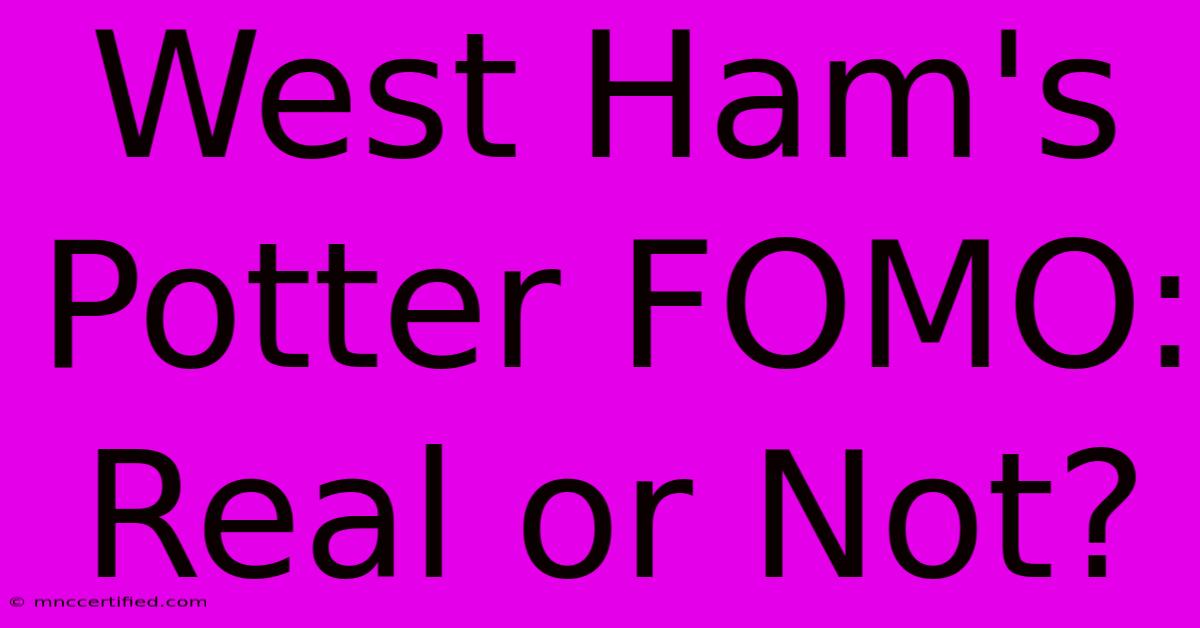West Ham's Potter FOMO: Real Or Not?

Table of Contents
West Ham's Potter FOMO: Real or Not?
The appointment of Mauricio Pochettino at Chelsea has left many wondering about West Ham's potential "fear of missing out" (FOMO) regarding Graham Potter. Was letting Potter slip to Brighton, and subsequently Chelsea, a strategic error, or a necessary risk that ultimately paid off? Let's delve into the complexities of this question.
The Graham Potter Puzzle: A Retrospective
Graham Potter's managerial career has been nothing short of meteoric. His innovative tactics and ability to develop young talent catapulted him from Östersunds FK in Sweden to Brighton & Hove Albion, where he established them as a Premier League force. His subsequent move to Chelsea, though ultimately unsuccessful, showcased the high demand for his services. This begs the question: could West Ham have benefited from securing Potter earlier in his career?
West Ham's Managerial Choices: A Calculated Gamble?
West Ham's decision-making process regarding managers has often been characterized by a blend of pragmatism and calculated risk-taking. While Potter's style might have appealed to many fans, West Ham's leadership clearly prioritized other qualities in a manager at the time. This decision, however, deserves closer scrutiny. The club's current form and league standing provide crucial context for evaluating the potential "what ifs."
Potter's Tactical Style: A Fit for West Ham?
Potter's possession-based style, while aesthetically pleasing to many, requires specific player profiles to execute effectively. West Ham's squad, even with recent significant investment, might not have been ideally suited to his approach. The question isn't just about securing Potter; it's about whether his tactics would have meshed with the existing playing personnel and club philosophy. An ill-fitting manager, regardless of reputation, could be detrimental.
Assessing the "FOMO": Fact or Fiction?
The feeling of FOMO regarding Potter is undeniably present within sections of the West Ham fanbase. Seeing a manager they might have considered thrive at another, albeit bigger, club is understandable. However, framing it as a definite mistake is premature. David Moyes, despite periods of criticism, has delivered European football and consistently navigated the club through challenging periods. His experience and understanding of the club's culture cannot be underestimated.
Alternative Perspectives: Beyond Potter
It's crucial to remember that success in football is rarely down to a single factor. While Potter’s potential benefits are clear, West Ham's current challenges – whether tactical, personnel-related, or otherwise – might not have been solved solely by his appointment. Focusing solely on the Potter "what if" risks ignoring other critical aspects of the club's performance.
The Long Game: Strategic Patience
West Ham’s approach might be better understood as a long-term strategy rather than a series of reactive decisions. Building a sustainable, successful club requires more than just hiring a high-profile manager; it involves carefully cultivating a team, developing youth talent, and creating a cohesive club culture. This process takes time and patience.
Conclusion: Context is King
West Ham's potential FOMO regarding Graham Potter is a complex issue, fueled by hindsight and the allure of a manager who has since gained considerable recognition. While Potter's success elsewhere might spark regret in some quarters, a balanced perspective considers the holistic approach West Ham has adopted. The club’s trajectory is not solely defined by a single managerial appointment but by a multifaceted strategy that encompasses player recruitment, tactical approaches, and long-term vision. Ultimately, judging the success or failure of their choice will require a longer timeframe and a more comprehensive assessment. The "Potter question" remains an intriguing case study in the ever-evolving dynamics of football management.
Keywords: West Ham, Graham Potter, Mauricio Pochettino, FOMO, Premier League, football manager, tactical style, managerial appointment, club strategy, David Moyes, Brighton, Chelsea, football analysis, West Ham United.

Thank you for visiting our website wich cover about West Ham's Potter FOMO: Real Or Not?. We hope the information provided has been useful to you. Feel free to contact us if you have any questions or need further assistance. See you next time and dont miss to bookmark.
Featured Posts
-
Latest On Potter Amid Everton Talk
Dec 10, 2024
-
David Coote Sacked Premier League Probe
Dec 10, 2024
-
Fortnite Refunds Ftc Pays 72 M
Dec 10, 2024
-
Post Split Rooneys Message To Coleen
Dec 10, 2024
-
Custom Sports Trading Cards
Dec 10, 2024